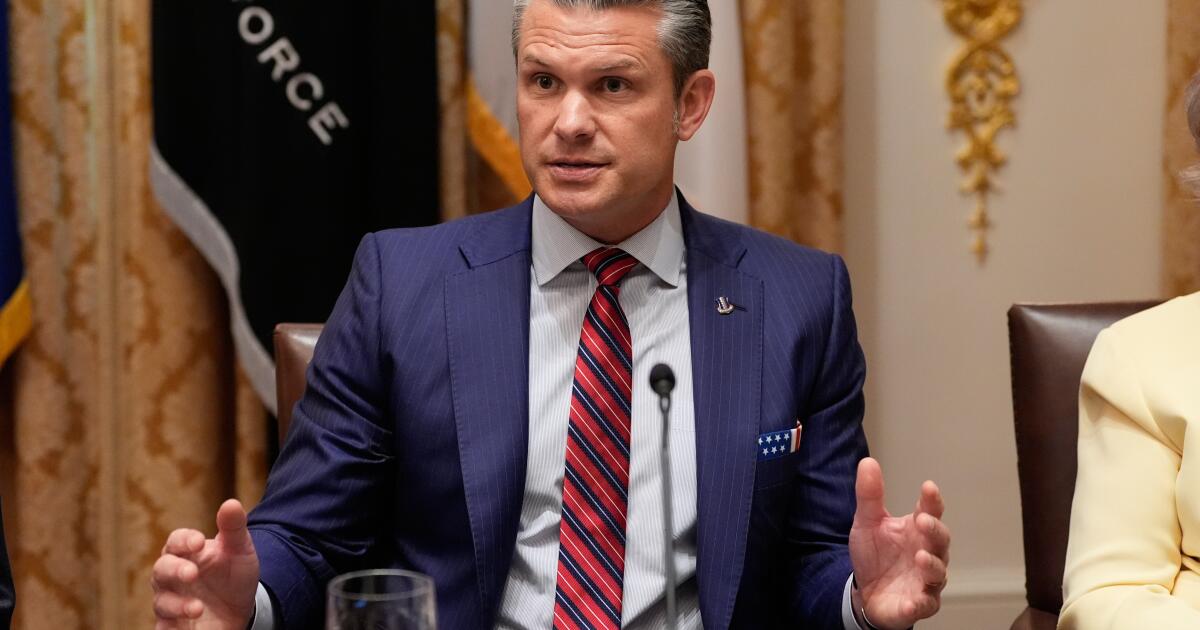WASHINGTON — An extraordinary new policy from the Defense Department that equates basic reporting methods to criminal activity has prompted a revolt among Pentagon journalists that could leave the nation’s largest agency and the world’s largest military without a press corps.
The new policy, from Defense Secretary Pete Hegseth, is a dramatic departure from historic standards at the department, which previously required credentialed reporters to sign a simple, single-page document laying out safety protocols.
Replacing that document is a 21-page agreement that warns reporters against “soliciting” information, including unclassified material, without the Pentagon’s official authorization, characterizing individuals who do so as a “security risk.”
The policy would force journalists and media organizations to refrain from publishing any material that is not approved by the military — a clear violation of 1st Amendment protections to free speech, lawyers for media outlets said.
Major news organizations including the New York Times, Washington Post and Wall Street Journal, as well as right-leaning outlets such as Newsmax and the Washington Times, have refused to sign the document, with only one far-right outlet — the cable channel One American News — agreeing to do so.
The Los Angeles Times also will not agree to the policy, said Terry Tang, the paper’s executive editor.
In a rare joint statement, ABC, CBS, CNN, Fox News and NBC said that the policy “is without precedent and threatens core journalistic protections.”
“We will continue to cover the U.S. military as each of our organizations has done for many decades, upholding the principles of a free and independent press,” the news outlets said.
But Hegseth, who has aggressively pursued leaks and sources of unfavorable news stories since the start of his turbulent tenure as secretary, has doubled down in recent days, posting emojis on social media waving goodbye as media organizations have issued statements condemning the policy. Journalists were given a deadline of 2 p.m. PDT on Tuesday to either sign the document or relinquish their credentials.
It is unclear whether it will be viable for the Pentagon to maintain the policy, leaving the secretary without a traveling press corps to highlight his official duties or public events. And it is also uncertain whether President Trump approves of the extreme measure.
At a White House event Tuesday, Hegseth said that the policy was “common sense” and that he was “proud” of it. He said credentials should not be given to reporters who will try to get officials “to break the law by giving them classified information.”
Asked last month whether the Pentagon should control what reporters gather and write, Trump said “no.”
“I don’t think so,” Trump said, adding: “Nothing stops reporters.”
But Trump said Tuesday that he understands why Hegseth is pushing for the new policy.
“I think he finds the press to be very destructive in terms of world peace and maybe security for our nation,” Trump said. “The press is very dishonest.”
The widespread revolt has generated a show of solidarity from the White House and State Department correspondents associations, which characterized the Pentagon policy in a joint statement Monday as an attack on freedom of the press.
“Access inside the Pentagon has never been about convenience to reporters,” the statement reads. “The public has a right to know how the government is conducting the people’s business. Unfettered reporting on the U.S. military and its civilian leadership provides a service to those in uniform, veterans, their families and all Americans.”
Beyond the restrictions on media outlets, the Pentagon has taken a series of steps this year to try and identify officials who are deemed disloyal or who provide information to reporters.
In April, the Pentagon dismissed three top officials after an investigation into potential leaks related to military operational plans. That same month, Hegseth’s team began subjecting officials to random polygraph tests, a practice that was temporarily halted after the White House intervened, according to the Washington Post.
Then, in October, the Pentagon drafted plans to renew the use of polygraphs and to require thousands of personnel to sign strict nondisclosure agreements that would “prohibit the release of non-public information without approval or through a defined process.” The nondisclosure agreements include language that is similar to what reporters are being asked to sign by Tuesday.
Notably, many of Hegseth’s plans to target leaks have been leaked to news outlets, probably contributing to the Defense secretary’s suspicion about whom he can trust.
The timing of his efforts are also noteworthy, as they gained traction after he personally shared sensitive details about forthcoming strikes in Yemen in a private Signal group chat that mistakenly included a reporter from the Atlantic. Hegseth also shared information about the attacks in a separate Signal chat that included his wife, a former Fox News producer who is not a Defense Department employee.
Hegseth denied that any classified information was shared in the chat. Yet the situation led to an internal review of whether the disclosures were in violation of Defense Department policies.
The Pentagon has taken an even more aggressive approach to restricting reporters’ access than the White House, which months ago took control over press operations from the White House Correspondents Assn. — an independent group that had organized the White House press corps for decades.
Still, the White House has refrained from implementing changes to the briefing room seating chart, evicting outlets from workspaces within the White House complex or revoking press passes, after facing a legal challenge over an attempt to bar one major outlet — the Associated Press — from covering some presidential events at the beginning of Trump’s second term.
Trump, meanwhile, has continued to single out individual outlets he dislikes. On Tuesday, for example, the president refused to take questions from ABC News because he said he did not like how a news anchor had treated Vice President JD Vance.
“You’re ABC Fake News,” Trump said at a public appearance in the White House. “I don’t take questions from ABC Fake News!”
